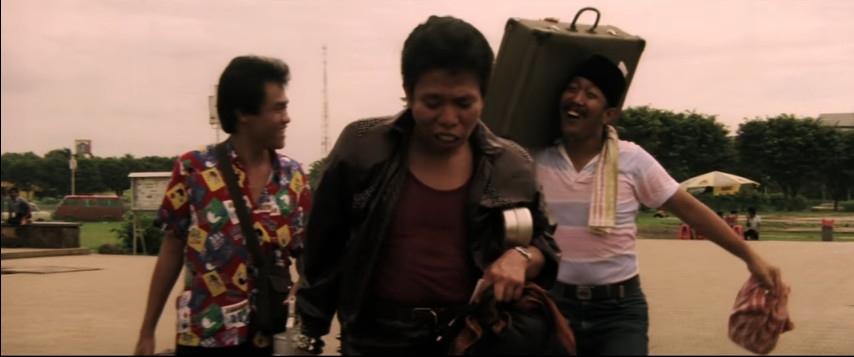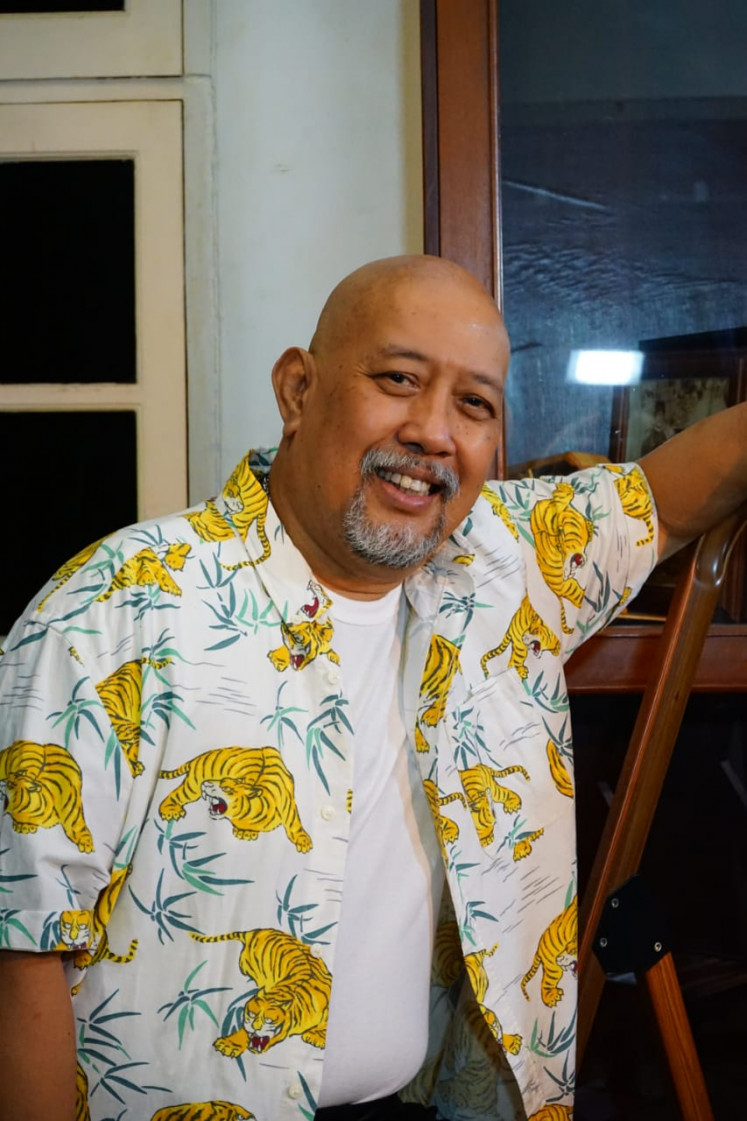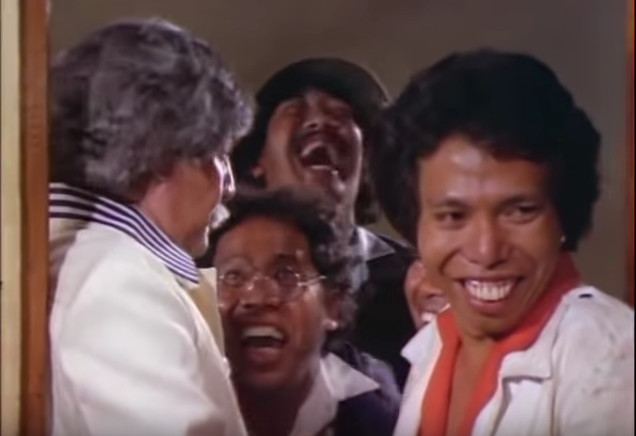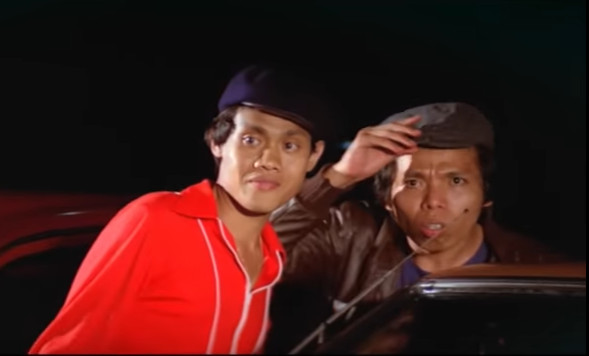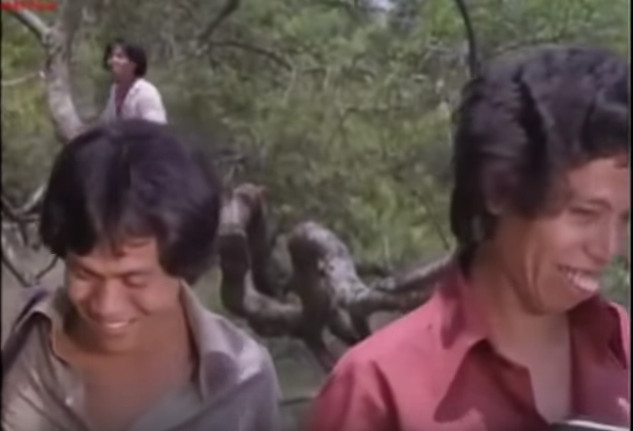Popular Reads
Top Results
Can't find what you're looking for?
View all search resultsPopular Reads
Top Results
Can't find what you're looking for?
View all search resultsIndro Warkop picks his favorite Warkop DKI films: Revisiting Indonesia’s iconic comedy trio
The movies of Warkop DKI defined a generation’s comedic take under the pressures of an authoritarian regime. Their laughter still rings long and true to reach younger viewers in today’s coronavirus-addled world, helped along by a new platform: Netflix.
Change text size
Gift Premium Articles
to Anyone
The movies of legendary trio Warkop DKI are now available for the first time ever on Netflix.
The legacies of Wahjoe "Dono" Sardowo, "Kasino" Hadiwibowo and Indrodjojo "Indro" Kusumonegoro – together known as Warung Kopi DKI, or Warkop DKI or even just “Warkop” for short – were cemented earlier with Warkop DKI Reborn, a series of movie remakes from 2016 to 2020 featuring a younger generation of actors.
But it’s the original Warkop DKI movies that turned the trio into cultural icons. Now, thanks to the global streaming platform, some of those titles are accessible for all to watch and experience, including a whole new generation of moviegoers.
Warkop DKI is known for their slapstick movies that often exploit common social stereotypes, all the while delivering critical commentary on Indonesian society and politics. This is no mean feat: The prolific comedic trio produced 34 movies, many of which became box office hits, during their heyday from 1979 to 1994 that just happened to coincide with the height of Soeharto’s New Order regime.
Dono was also a political activist and played a role in the 1998 Reformasi movement that culminated in the authoritarian president’s downfall.
Warkop DKI’s Journey
Before they hit the big screen, Warkop delivered bold social commentary on stage and on their weekly comedy show on Prambors FM. Their comedy sketches, distributed on cassette tapes, were wildly popular.
The group had started as a quintet but dwindled to a trio after Rudy Badil left due to stage fright, followed by Nanu Mulyono after their first feature film. When they started making films, the trio adopted a new formula for a wider audience, toning down the politics and ramping up the double entendre (which would probably be slammed as “sexist” today).
It worked. According to PT Perfin, then the national film distributor, Maju Kena Mundur Kena (1983; Just can’t win) sold 658,896 tickets, making it the most successful Indonesian movie of the year.
In 1994, Warkop started airing a TV sitcom. But three years later, Kasino died of a brain tumor, and Dono’s death in 2001 was the nail in the trio’s coffin.
The Warkop Legacy
Warkop DKI is a cultural touchstone for Indonesians. The trio’s catchphrases are still used today, including “Gila lu, ‘Ndro” (Indro, you’re crazy), for when someone does something crazy. Another is Kasino’s classic insult for Dono: “Bodoh dipiara, kambing dipiara bisa gemuk!” (just feeding stupidity, at least feeding a goat makes it fat).
Randy Danistha, who played Indro in Warkop DKI Reborn 3 and 4 (credited as Randy Nidji on IMDb.com), said the trio’s biggest legacy was teaching Indonesians to laugh, no matter what happens.
“Our country is messed up, but [Indonesians] can always find something to laugh about,” said the 36-year-old actor and musician. “That’s why we can’t move past receh [corny] jokes. It’s been ingrained in [our] blood.”
Indro’s top 5
“Not all Indonesian movies have received the same amount of attention, so I’m grateful. Over the last 40 years, many of our titles are still being watched frequently,” said Indro, who is the only living member of the original Warkop DKI and is still active in the industry at 62.
So we asked Indro to pick his top five Warkop DKI movies and share his memories of them. Here they are, in no particular order:
- Jodoh Boleh Diatur (1988; Matchmaking)
Dono, Kasino and Indro seek the services of a dating agency. What could possibly go wrong? A joint production with Malaysia, the movie was trimmed from 2 to 1.5 hours for the Indonesian audience. Indro says the film gives the audience the trio’s complete repertoire.
“When you watch it, you may cry, laugh and be moved,” he says. “It also still has a little bit of satire and autocriticism.”
- Sama Juga Bohong (1986; It’s all lies)
“At this point in Warkop’s career, I started to enjoy being directed. It was also our first time doing a movie with a high-profile director, the late Chaerul Umam,” he recalls.
“The satire is strong in this one, and yet the execution is really smooth. Normally we do things a bit raw, but it’s a lot smoother here and overall there’s a clear sense of direction. It’s like when Warkop did tapes, ‘Dokter Masuk Desa’ (The doctor goes to a village) for example, our point was to talk about the state of healthcare in the country.”
- Manusia Enam Juta Dollar (1981; Six-million-dollar man)
A parody of the highly popular American TV show, The Six Million Dollar Man, this was Warkop’s first foray into playing characters aside from themselves.
“We had worked with good directors before, but in this movie I really felt the significance of having a director. Ali Shahab, the director, wouldn’t let us play as ourselves. Everyone was given a character.
“Other directors would often just go, ‘They’re comedians, don’t change anything, just give them a script and see how it unfolds.’ But Ali was the captain of the ship. He was in charge of everything. It was so fun to be directed down to a T like that.”
- Pintar-Pintar Bodoh (1980; Clever fool)
“This is where we started to figure things out. It was still our brand of comedy, but we realized that the audience didn’t really care so much about the storyline as long as they were laughing,” Indro says.
“The movie was a hit but it was hard work. It would take us 10 to 15 meetings to approve the script. It was also the first time we were separated and pitted against each other. So there was a conflict between Dono, Kasino and myself. It was very intriguing.
“And of course, it gave birth to the iconic line ‘Yang baju merah jangan sampe lolos’ (Don’t let the one in red get away), when Kasino tells Dono to chase after a certain woman.”
- Mana Tahaaan… (1979; Can’t handle it)
“Obviously, this one is memorable because it was our first film. We created the story ourselves and I learned a lot about filmmaking here. On the very first day of shooting, I did [the scene] in one take, while the other guys needed 14 and 28 takes,” he recalls, laughing.
“During the shoot, I was given my own room to study in, because I was getting ready for a university exam. Dono and Kasino, who were older, really looked after me and told me to prioritize my studies.
“It’s not about the title, but the way of thinking. To be able to capture something in our lives and reexpress it [as] entertainment, social criticism and satire requires a certain level of intelligence. That’s what my Warkop brothers taught me.”

